Philosophy Imprisoned
Philosophy Imprisoned
The Love of Wisdom in the
Age of Mass Incarceration
Edited by
Sarah Tyson and Joshua M. Hall
LEXINGTON BOOKS
Lanham Boulder New York Toronto Plymouth, UK
Published by Lexington Books
A wholly owned subsidiary of Rowman & Littlefield
4501 Forbes Boulevard, Suite 200, Lanham, Maryland 20706
www.rowman.com
10 Thornbury Road, Plymouth PL6 7PP, United Kingdom
Copyright 2014 by Lexington Books
All rights reserved. No part of this book may be reproduced in any form or by any electronic or mechanical means, including information storage and retrieval systems, without written permission from the publisher, except by a reviewer who may quote passages in a review.
British Library Cataloguing in Publication Information Available
Library of Congress Cataloging-in-Publication Data
The love of wisdom in the age of mass incarceration / edited by Sarah Tyson and Joshua M. Hall.
pages cm
Includes bibliographical references and index.
ISBN 978-0-7391-8947-4 (cloth : alk. paper)ISBN 978-0-7391-8948-1 (electronic)
1. PrisonsPhilosophy. 2. ImprisonmentPhilosophy. 3. PrisonsSocial aspects. 4. ImprisonmentSocial aspects. I. Tyson, Sarah, editor.
HV8501.L68 2014
365.01dc23
2014022597
 TM The paper used in this publication meets the minimum requirements of American National Standard for Information Sciences Permanence of Paper for Printed Library Materials, ANSI/NISO Z39.48-1992.
TM The paper used in this publication meets the minimum requirements of American National Standard for Information Sciences Permanence of Paper for Printed Library Materials, ANSI/NISO Z39.48-1992.
Printed in the United States of America
Acknowledgments
We wish to thank James Bradshaw, Jim Bradshaw, Lori Gruen, Drew Leder, Stacey Reeh, and Judith Tannenbaum for their help in establishing and maintaining communication across the prison walls.
We wish to thank David Duncan, Kennath Artez Henderson, and Donny Johnson for permission to use their artwork. And thanks to Nick Lerman, Lisa Guenther, and Rohan Quinby for their technical assistance with reproducing that artwork.
We owe a special thanks to Rachel Shanahan for her heroic help in preparing the manuscript.
We wish to thank the wonderful team at Lexington Books, especially Jana Hodges-Kluck, Natalie Mandziuk, Joe Miller, and Jay Song. We also wish to thank the anonymous reviewers whose comments helped make this a better book.
We also wish to thank the people who participated in the philosophy class from which the idea for this book was born: Abu Ali AbdurRahman, Geoffrey Adelsberg, Devin Banks, Kevin Burns, Ron Cauthern, Natalie Cisneros, Gary Cone, David Duncan, Lisa Guenther, Kennath Artez Henderson, Olen Hutchinson, Don Johnson, Donald Middlebrooks, Harold Wayne Nichols, Richard Odom, Pervis Payne, Derrick Quintero, and Scott Zeman.
Finally, we wish to thank the following people for their help, guidance, encouragement, and well-timed jokes as we worked on Philosophy Imprisoned: Buick Audra, Josh Fuson, Lisa Guenther, Chad Kautzer, Lucius Outlaw, Carl Tyson, and Toni Tyson.
Introduction
Philosophy Imprisoned in large part owes its origin to a philosophy class that the editors took on Tennessees death row with Lisa Guenther in the spring and summer of 2012. Compelled by our life-changing experiences in that class, especially the relationships we built with people inside the walls of the prison, we sought to bring together some of the voices of people who have also encountered philosophy inside. Perhaps we should have anticipated, given our own experiences of philosophy in prison, that the voices we have brought together would not be in harmony. Yet, we have sometimes worried about the discordance readers will find in its pages; we have worried, in part, because we were not sure how to hear the discordance we have found there.
Indeed, as editors, we are tempted to find a way of harmonizing these voices, bringing them into some accord that would still let the voices speak their many messages. But we have come to recognize that the material conditions of this books production, the innumerable wall crossings of people, letters, and books required to bring it into existence, give rise to its discordance.
Mass incarceration leads not only to the conglomeration of some people into dangerous criminal populations, though it is very effective at that, but also to the conglomeration of other people into a population of law-abiding citizens. Indeed, the safety of those law-abiding citizens is used to justify the imprisonment of 2,228,400 people in the United States, as well as the state monitoring of 4,781,300 via parole and probation. The boundaries between these criminal and law-abiding populations are porous, though to a greater or lesser degree based on race, class, sexuality, gender identification, immigration status, religion, and age. In short, in this system, some people are marked criminal from the beginning.
We began to realize that honoring the discord of the voices in this book meant refusing to produce it for one of these audiences or another. In fact, it required the recognition that those who become students and teachers of philosophy in prison are already refusing to be bound by some of the most important divisions in contemporary society. After all, one who is assumed to be born criminal is not born to be a university student, and the university is the main site of philosophy in the United States today. For this reason, there is something potentially transgressive about philosophy in prison based solely on the fact that philosophy is so inaccessible to those for whom the university, too, is inaccessible.
Indeed, a strange result of mass incarceration is that it has become a site of access to philosophy. Despite concerted attempts to close down education in prisonincluding denying Pell Grants for people in prisonpeople keep finding ways to hold philosophy classes within prison walls, send across philosophical materials, and engage in philosophical discussion through letters that sometimes have to be resent several times to make it across those walls. Some of the programs that have created classrooms, like the Inside-Out Prison Exchange Program and the Bard Prison Initiative, are discussed in these pages. The impact of some of the philosophical materials that have made it inside are also recorded here, as are the trials and joys of philosophy via personal correspondence.
But what good is philosophy in prison? The chapters in this volume offer some answers and raise many more questions. We remain awed by the many stories of political, personal, and philosophical transformation attributed to experiences of philosophy in prison. And we are saddened, but also educated, by the stories of despair and resignation that are reflected here.
In the worst moments of despair we find a kind of discord. But it is a discord created by contrapuntal notes of hope, resilience, and resistance. There is a conflicted ambivalence, moreover, even within individual authorial voices. In this discordance, we see how people continue to return to critical conversations about what prisons are for, if they can be made better through reform, or if they must be abolishedeven within conditions that could not be more inimical to those conversations.
Indeed, we hope that the discord we find ineliminable between and within these chapters will help foster the knowledge in some readers, and sustain it in others, that there is something fundamentally wrong and broken with the system of mass incarceration. We hope the discord causes readers to look at the injustice of prisons, rather than wishing for a more harmonious volume. We think the most wide-ranging power of the discord in this volume is its ability to be re-purposed or re-signified into an instrument for illuminating and ameliorating the sometimes hidden, but always powerful, inequalities outside the prison walls. For, as many of these chapters attest, the outside both constructs the prison walls and is also constructed by them.
Next page
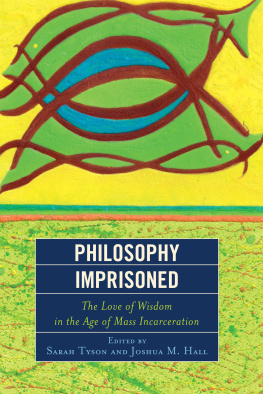


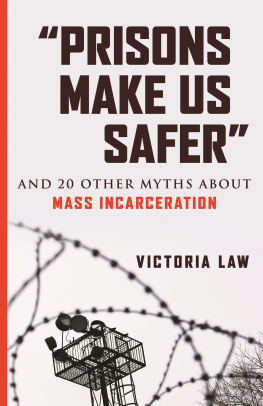
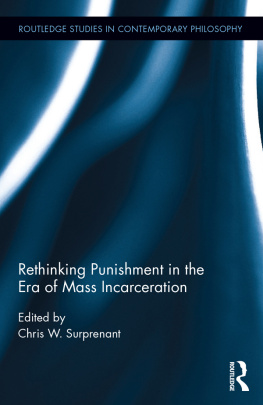
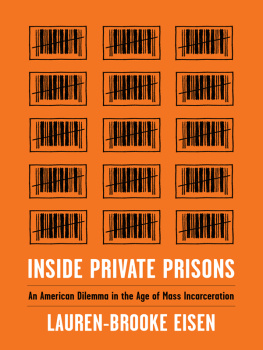
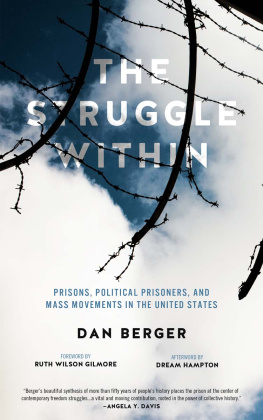
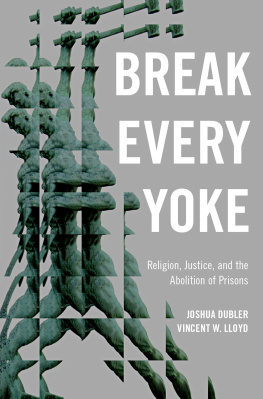

 TM The paper used in this publication meets the minimum requirements of American National Standard for Information Sciences Permanence of Paper for Printed Library Materials, ANSI/NISO Z39.48-1992.
TM The paper used in this publication meets the minimum requirements of American National Standard for Information Sciences Permanence of Paper for Printed Library Materials, ANSI/NISO Z39.48-1992.